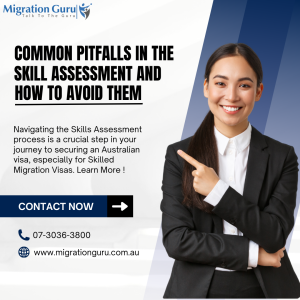is exciting, but it can also be challenging—especially when it comes to the Skills Assessment process. This crucial step in applying for a Skilled Migration Visa can determine whether your application moves forward or faces significant delays. Unfortunately, many applicants encounter common pitfalls that could have been easily avoided with the right guidance.
In this blog, we’ll explore these common mistakes and provide practical solutions to help you navigate the Skills Assessment process successfully. With these tips in hand, you’ll be better prepared to avoid delays and setbacks, bringing you one step closer to achieving your Australian dream.
1.Submitting Incomplete or Incorrect Documentation
One of the most common mistakes applicants make is submitting incomplete or incorrect documentation. Missing documents or inaccurate information can lead to delays in processing or, worse, a negative outcome on your Skills Assessment.
 Solution:
Solution:
- Double-check the requirements: Each assessing authority has specific documentation requirements. Make sure you thoroughly review and understand these before submitting your application.
Organize your documents: Create a checklist of all required documents and tick them off as you gather each one. Ensure that all documents are certified copies, if required, and that translations are provided for non-English documents.- Verify accuracy: Before submitting, cross-check all details for accuracy, from your personal information to your employment history. Even small errors can cause significant delays.
2.Not Meeting the English Language Requirement
English proficiency is a key requirement for many Australian visas. Unfortunately, some applicants overlook this aspect or assume their English skills are sufficient without verification through a recognized test.
Solution:
- Understand the requirement: Check the specific English language proficiency level required for your visa category. This usually involves taking a recognized test such as IELTS, TOEFL, or PTE.
- Prepare thoroughly: If you’re unsure of your language skills, consider taking practice tests or enrolling in a preparatory course to ensure you achieve the required scores.
- Submit your results: Ensure that your English test results are valid and meet the minimum score requirements when you submit your Skills Assessment application.
3.Inadequate Evidence of Work Experience
Your work experience is a critical factor in the Skills Assessment process. Failing to provide adequate evidence can result in a negative assessment, which can significantly hinder your visa application.
Solution:
- Gather detailed evidence: Collect documents such as detailed reference letters from your employers, pay slips, employment contracts, and tax records. These should clearly outline your job role, responsibilities, and duration of employment.
- Follow format guidelines: Each assessing authority may have specific requirements for how evidence should be presented. Ensure your documents meet these guidelines.
- Be comprehensive: Don’t leave out any relevant work experience, especially if it’s directly related to your nominated occupation. The more detailed and accurate your evidence, the stronger your application.
4.Not Following the Assessing Authority’s Guidelines
Each assessing authority in Australia has its own set of guidelines and criteria for assessing qualifications and experience. Not adhering to these guidelines is a common reason for delays or rejections.
Solution:
- Research your assessing authority: Before starting your application, thoroughly research the guidelines provided by your assessing authority. This information is usually available on their official website.
- Follow instructions carefully: Pay close attention to specific instructions regarding document formats, submission methods, and any additional requirements unique to your occupation.
- Consult a professional: If you’re unsure about any aspect of the guidelines, consider consulting with a migration expert who can provide clarity and ensure you’re on the right track.
5.Delays in Obtaining Required Documents
Waiting until the last minute to gather necessary documents is a recipe for delays in your Skills Assessment process. Some documents may take longer to obtain, particularly if they need to be certified or translated.
Solution:
- Start early: Begin collecting your documents as soon as possible. Some documents, like reference letters or academic transcripts, may require time to obtain, especially if they need to be sourced from overseas.
- Follow up regularly: Keep track of your document requests and follow up if there are delays. It’s important to ensure that all documents are ready before you submit your application.
- Plan for contingencies: Be prepared for any potential delays by starting the process well in advance of any deadlines.
6.Underestimating the Time Needed for the Process
The Skills Assessment process can take anywhere from a few weeks to several months, depending on the complexity of your application and the efficiency of the assessing authority. Underestimating this timeline can lead to rushed applications and missed opportunities.
Solution:
- Plan ahead: Familiarize yourself with the typical processing times for your assessing authority. These times are usually available on their official website.
- Allow for delays: Build in extra time for unexpected delays, such as requests for additional documentation or longer-than-expected processing times.
- Track important dates: Keep a calendar of important dates, such as when you submitted your application, expected processing times, and any deadlines related to your visa application.
Conclusion: Navigating the Skills Assessment Process with Confidence
Avoiding these common pitfalls in the Skills Assessment process can significantly increase your chances of a successful outcome. By being thorough, proactive, and informed, you can navigate this critical step with confidence, paving the way for a smoother visa application process.
At Migration Guru Pty Ltd, we specialize in guiding applicants through every stage of the Skills Assessment and visa application process. Our expertise ensures that you avoid common mistakes and maximize your chances of success.
Need help with your Skills Assessment? Contact Migration Guru Pty Ltd today!
- Website: www.migrationguru.com.au
- LinkedIn: Migration Guru Pty Ltd
- Facebook: Migration Guru
- Email: info@migrationguru.com.au
- Phone: +61-0730363800
Your Australian journey begins with a successful Skills Assessment—let us help you get there!

